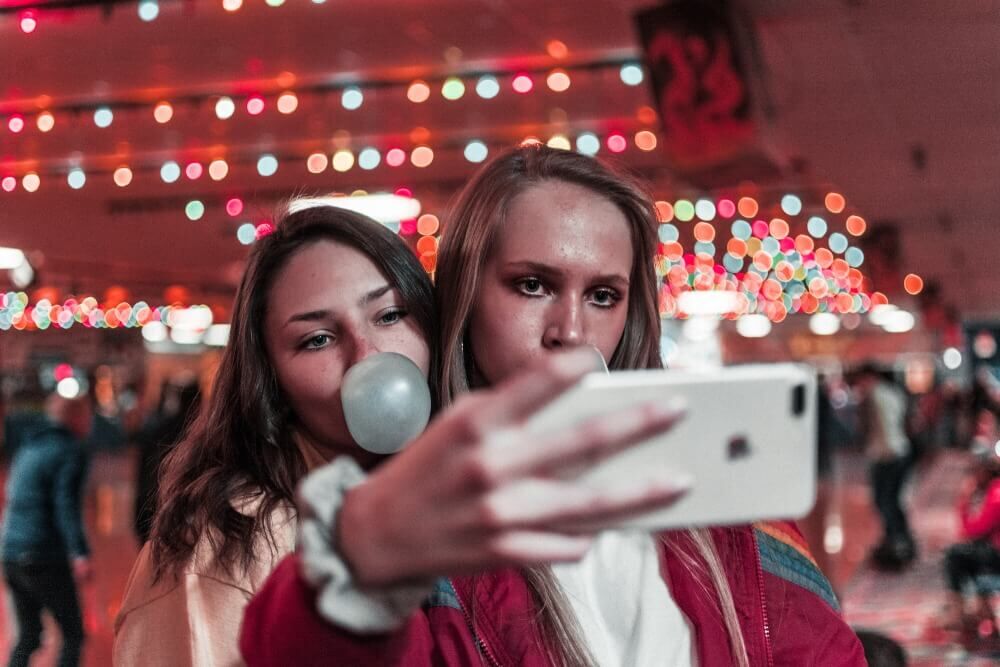Since its inception, social media has been making a case for itself as either society’s greatest asset or ultimate demise. According to a study from educational feminist nonprofit The Female Lead, it could be both.
The study found that young girls are susceptible to both the positive and negative influences of social media and suggests that, while social media can and does contribute to poor body image, low self esteem, and mental health issues, these negative effects can be mitigated by mindful, intentional social media consumption.
Listen, it’s safe to say social media isn’t going anywhere—it fully cemented itself in our society around the same time memes and GIFs became their own language. So, it’s high time we start learning how to use the medium to our advantage rather than our detriment.
According to the CDC, 57% of girls reported “persistent feelings of sadness or hopelessness” in 2021, up from 36% just ten years prior. It can be reasonably assumed that some of that increase is linked to social media becoming intrinsic to daily life for most young people in the past decade. This theory is supported by a statistic from The Female Lead that says that 78% of people believe social media has negatively impacted the way they feel about their bodies. These numbers mean it is more crucial than ever to start helping girls and women use social media to empower them, rather than hinder them.
The Disrupt Your Feed study set out to learn if, rather than restricting social media use, we instead combat the negative mental health effects of social media by empowering girls to intentionally curate their feeds by following inspiring, positive, role models. The results are encouraging, finding that a diversified social media feed not only improved girls’ relationship with social media, but also increased their ability to self-regulate social media consumption, helped them contextualize future career aspirations, and broadened their worldview.
One study participant said that following women who had jobs she might be interested in in the future, “…showed that you can be a woman, have fun, and be an engineer all at the same time.” Participants also noted that seeing the day-to-day for women working in a certain field was helpful in showing what that career was actually like rather than just seeing the shiny, finished product of success that’s typically shared online. Another participant said, following the study that, “I don’t have to be hourglass and be a makeup artist or a model. I can be successful and independent. It’s no longer just about what I look like but actually about what I think, which is definitely more important.”
The Female Lead has taken their findings and launched a campaign to encourage girls and women to pledge to #DisruptYourFeed, by interrupting the barrage of heavily-altered images and toxic content on their social media feeds by following positive, empowering role models. The method they recommend is to 1. Scroll with purpose, 2. Challenge the algorithm, and 3. Take the lead in your own feed. The nonprofit is helping girls take the pledge by sharing inspiring stories and empowering content creators to follow on their own social media feeds, as well as curating a list of positive role models to follow.
Most people have, at some point, fallen victim to the incessant self-comparison that comes from scrolling through your average social media feed. It’s hard to avoid when you must sort through a slough of edited, facetuned, and filtered images just to catch up on what your friends and family have been doing online. It can be exhausting to constantly be reminded that your physical features might not line up with what is deemed conventionally attractive by society. In a video from The Female Lead, clinical psychologist and online educator Dr. Julie Smith summed this up by saying, “The sorts of pressures and expectations that used to be in a magazine that you could put down [are] now available 24/7 in a never ending feed on social media platforms, and the images are more altered than ever.”
Even so called “body-positive” accounts can be rife with fatphobic language, edited photos, and strategic posing that would make anyone feel bad about themselves. And it seems like teen girls have more to dodge than the average social media consumer—from beauty standards that can sometimes only be achieved by surgery, pressure to be deemed attractive and put-together at all times, to the seemingly unending carousel of misogynistic podcasts (seriously, we should have never given men microphones)—the potential for consuming harmful content is high.
Combating the negative effects that social media has on girls feels like a daunting task, but if I know anything about girls, it’s that they eat daunting tasks for breakfast. Girls are our future, and they deserve to see the greatness they contribute to the world reflected back to them in their social media feeds. By disrupting our feeds and uplifting voices that are dedicated to women being extraordinary regardless of societal pressures or expectations, we can impact the way girls and women view themselves in everyday life. Social media doesn’t have to be a source of negativity or comparison and can instead be used to engage positively with each other and ourselves.
Top photo by Ben Weber on Unsplash


